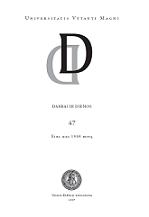Nebūties akivaizdoje: Miloszas - disidentas
Facing nonexistence: is Milosz a dissident?
Author(s): Mirosław Adam SupruniukSubject(s): Language and Literature Studies
Published by: Vytauto Didžiojo Universitetas
Keywords: Facing; nonexistence; Milosz; dissident;
Summary/Abstract: Was Czesfaw Milosz, who achieved international fame, a dissident? The very idea of "dissidence" is not traditionally related with recognition. Mifosz, however, opposed the dominant ideas of every society and every epoch. Nonetheless, this wise man, who reached the age of 93, was always recognized and highly visible. Vilnius is associated with the first stage in the life of Milosz. There he jointly established a poets' group, Žagarai, with other writers. In this Catholic and conservative town, Milosz undoubt¬edly belonged with the leftists. Later he worked for Polish radio, which ultimately led him to move to Warsaw. His solid leftist leanings explain his assignment as the press attache of the Polish Em¬bassy in Washington for the Diplomatic Service of the new regime in Poland. In 1950 he moved to Paris where, horrified by the Stalinist regime, he chose emigration. At the time the poet was harshly criticized by conservative London emigres. However, he won acceptance among the people who congregated around the Parisian culture which displayed more creative political thought. Despite the opinions that predominated among French leftist intellectuals, The Captive Mind was immediately acknowledged as the most important work in its field. The book revealed the in¬sidious power of dialectical materialism. It hit the system straight in the bull s eye since it analyzed, what the poet later referred to as, the "Hegelian bite".
Journal: Darbai ir dienos
- Issue Year: 2006
- Issue No: 46
- Page Range: 105-118
- Page Count: 14
- Language: Lithuanian

